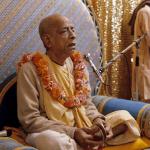
Back To Prabhupada, Issue 12, Summer 2006
In the United States, the President is subject to an electoral rule
known as “term limits”. This states that he must be removed from office
after 2 terms (8 years), and the voters are not given the choice of
deciding whether or not they wish for him to continue. As we will now
show, it seems that our largely American GBC have also decided to apply
this political device to the parampara (disciplic succession of
bona fide Gurus).
The GBC’s chief argument as to why Srila Prabhupada must be replaced as
the diksa Guru of ISKCON, is that to keep him as the Guru for
ISKCON would “end the parampara”. Let us examine if this
statement is supported by Srila Prabhupada.
- No one is disputing that when Srila Prabhupada established ISKCON and became its diksa Guru in 1966, this act of Srila Prabhupada initiating disciples was seen as the parampara CONTINUING with Srila Prabhupada. Nobody is arguing that Srila Prabhupada acting as the Guru of ISKCON from 1966 onwards, was an act which caused the parampara to end. Thus Srila Prabhupada acting as the Guru of ISKCON is not seen as ending the parampara, but continuing it.
- So how then does the idea of Srila Prabhupada continuing to act as
the diksa Guru of ISKCON, which itself CONTINUED the parampara, now paradoxically END the parampara? How
can that which hitherto was the very cause of the parampara continuing, now be the source of its very end? That’s where “term
limits” come into play. For it is argued that no Guru can exceed his
term limit of acting as Guru – this term limit being as long as he has a
physical body. We thus have another paradox, in that a SPIRITUAL master’s ability to act as a spiritual master, is now defined via the
availability of his PHYSICAL body. That is, to use the political
analogy, a spiritual master is “constitutionally” forbidden from
accepting disciples as soon as he loses the use of his PHYSICAL body.
But there is one problem with this “term limit” argument. Srila
Prabhupada never stated this “term limit” for a spiritual master’s
operation. Therefore, in the absence of an explicit statement from Srila
Prabhupada confirming the above argument, the argument remains simply
speculative, and we need not consider it any further since it lacks
authority.
There are, however, two statements from Srila Prabhupada which are
mistakenly used to support this “physical absence term limit” argument.
One is the following:
 |
|
However, this does not state a term LIMIT for when the Guru can act. On the contrary, it actually states a term
limit in which the Guru can NOT be replaced. To again use the
political analogy, the GBC’s argument is akin to saying that after 4
years in office a President must be removed. The letter above, however,
is akin to saying that a President must rule for at least 4 years before
it is even possible to remove him.
Stating the time period for when someone can NOT be replaced is
not the same as giving a time period in which he MUST be
replaced!
The other statement erroneously used to support the “term limit”
argument is:
“One who is now the disciple is the next spiritual master.”
(Srimad-Bhagavatam, 2.9.43)
However, this does not even imply the GBC’s
“physical absence term limit” argument, as it does not give a mandatory
time period within which a disciple must become a spiritual master; or
further, that such a time period is explicitly linked to the spiritual
master’s physical ABSENCE. On the contrary, the above quote is
used in the context of the parampara involving Brahma, Narada and
Vyasa, all of whom are still said to be physically PRESENT.
Thus, in conclusion, there is no statement supporting this “physical
absence term limit” argument. Hence, Srila Prabhupada acting as the diksa Guru of ISKCON does not end the parampara, but actually CONTINUES the parampara, since as a bona fide member and
the current link of the parampara, Srila Prabhupada, continues to
connect devotees to the parampara.
However, the guru hoax system currently practised by ISKCON does END the parampara, since it has replaced the genuine, authorised and
current link in the parampara – Srila Prabhupada – with numerous
unauthorised false gurus, who are unable to represent or connect anyone
to the parampara. Further, even by their own false “physical
absence term limit” argument, the GBC’s guru hoax program can be seen as
ending certain branches of the ISKCON parampara, since as soon as
one of their unauthorised gurus leaves his body, immediately a disciple
would need to succeed him, lest the “parampara stop”; and yet the
following GBC gurus are all physically absent and NO “living
guru” has replaced them to become the next GBC authorised “living link”
in the parampara:
- HH Gaura Govinda Swami: “parampara” ended in 1996
- HH Tamal Krishna Goswami: “parampara” ended in 2002
- HH Sridhara Swami: “parampara” ended in 2004
- HH Bhakti Tirtha Swami: “parampara”
ended in 2005
“Gurudeva did not leave, or could he possibly leave a successor.”
(BT Swami disciple’s forum, July 8th, 2006)
It is ironic that on the one hand the GBC have
argued that in the case of Srila Prabhupada the “law” of disciplic
succession means that all his disciples immediately are supposed to
become guru on his departure, and indeed in this case we had 11
immediate replacements; yet as seen from the cases above, the GBC are
unable to find even one person to continue the “living parampara” and “succeed” the guru after many years.
Srila Prabhupada acting as the diksa Guru for ISKCON continues
the parampara, whilst ISKCON’s unauthorised guru system has ended
the parampara.
Subscribe for FREE to Back To Prabhupada Magazine - Click Here